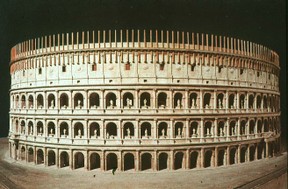 We only know bits and pieces about Curio the Younger, but a picture begins to form from them all.
We only know bits and pieces about Curio the Younger, but a picture begins to form from them all.
He built the first amphitheater in Rome, ostentatiously to honor his father, a famous orator.
Curio's character was said to be flamboyant, reckless and licentious. He ran up greater debts than he could possibly afford to pay, then persuaded high ranking men to pay them off for him.
Then he married twice. Once to Fulvia, an aristocratic Roman lady, with whom he had no children, though she did bring a step-daughter with her. And once to Mark Anthony, of Antony and Cleopatra fame.
Anthony was only a youth at the time and he was affectionately known as Antinous. Curio the Younger so introduced him to the high life, that the young man quickly ran up a lot of drinking debts. Curio the Elder immediately banned him from the house, in fear that his own son would be left to pick up the tab.
Enter Cicero. The straight-laced statesman was a friend of the family, and also a lawyer. Though he didn't approve of the relationship between Anthony and Curio the Younger, he did have some words to say on legal matters.
The fact was that Anthony had been playing the field, until the men were 'united in a stable and permanent marriage'. (Philippic 2.18.45) In doing so, according to Roman law, the 'bride' was owed a dowry payable by the groom's family. It was Curio the Younger who acted 'just as if he had given (Anthony) a matron's stola'.
Curio the Elder just gave up and paid Mark Anthony's drinking debts. In doing so, he merely accepted the marriage.
The whole episode is notable for the complete lack of surprise felt by anyone that two men were effectively spouses in Rome, around 50 BCE. It also demonstrates the degrees of marriage available during the early Roman Empire.
Curio the Younger was married to Fulvia throughout his union with Mark Anthony. After Curio was killed, while fighting in one of Caesar's campaigns, Anthony merely took Fulvia as his wife.


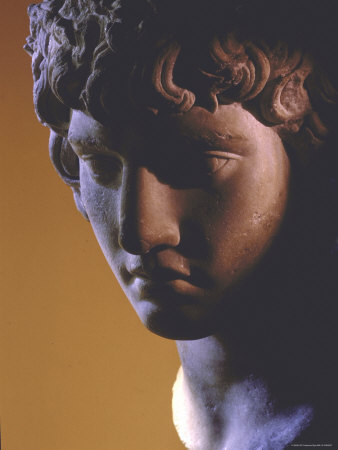
 We only know bits and pieces about Curio the Younger, but a picture begins to form from them all.
We only know bits and pieces about Curio the Younger, but a picture begins to form from them all.


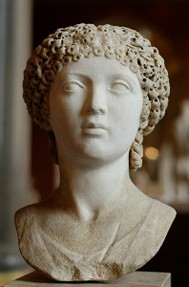 The nuptials were celebrated in extravagant festivals in both Rome and Greece. The Emperor Nero arrived at the ceremony in full military garb. His husband Sporus did not.
The nuptials were celebrated in extravagant festivals in both Rome and Greece. The Emperor Nero arrived at the ceremony in full military garb. His husband Sporus did not.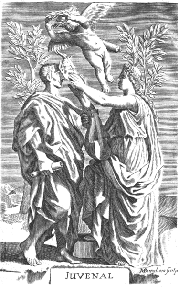 Decimus Lunius Luvenalis lived at the turn of the 1st and 2nd centuries CE and wrote poetry under the pseudonym of Juvenal. His most famous work was the Satires.
Decimus Lunius Luvenalis lived at the turn of the 1st and 2nd centuries CE and wrote poetry under the pseudonym of Juvenal. His most famous work was the Satires.


 The problem with Elagabalus, as far as Rome was concerned, was not his homosexuality per se. Less than one hundred years previously, everyone had quite happily accepted Hadrian's love for Antinous.
The problem with Elagabalus, as far as Rome was concerned, was not his homosexuality per se. Less than one hundred years previously, everyone had quite happily accepted Hadrian's love for Antinous.


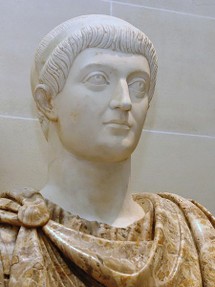 When the Emperor Constantine overtly converted to Christianity, it set in motion a series of events which are still felt to this day.
When the Emperor Constantine overtly converted to Christianity, it set in motion a series of events which are still felt to this day.






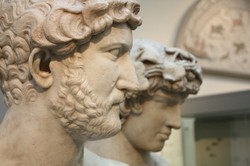

 St Tydecho's Churches in West Waleson 09/03/2014
St Tydecho's Churches in West Waleson 09/03/2014
 Goodies for an Outlander Premiere Partyon 03/06/2015
Goodies for an Outlander Premiere Partyon 03/06/2015
 Holocaust Memorial Day Interview with Rainer Höss, Grandson of Rudolf Architect of Auschwitzon 01/24/2015
Holocaust Memorial Day Interview with Rainer Höss, Grandson of Rudolf Architect of Auschwitzon 01/24/2015
 Romantic Valentine Gifts for an Outlander Fanon 01/16/2015
Romantic Valentine Gifts for an Outlander Fanon 01/16/2015



Comments
Ah! I see! What I do is write until the article is finished, however long that is. Right now, I'm struggling because an article that I want to write is too short. I've never had that before! I didn't realise that Wizzley warned you. LOL
Actually, I like the size of your articles because it seems to fit the subject matter just right each time -- holds the attention and all, so they don't seem long. What I had to pause twice was the video. But I'm glad you included it! It added an extra dimension to the article.
You're very welcome; and thanks for coming back to read it so often! I really did write a novel, didn't I?
So interesting, Jo! Thanks so much for taking the time to put such great articles together. I had to come back to this article several times before I had time to finish it, but am so happy I did. I also watched the video -- glad you included that, too.
Indeed! And I haven't even got to Ancient Greece yet. It was very acceptable there. :)
Great article! If only people could see there's nothing new under the sun...
Nero was the perfect example of what happens if a human being is allowed to do whatever they want to do, and is a psychopath. It's quite scary when you really begin imagining those scenes.
As a Classicist, Nero was completely nuts in every meaning of the word. His antics with burning the Christians for light was my O'Level exam translation text and I seriously thought I had mistranslated! I do enjoy the Classical Roman Emperors, they were the most fun. Anything and everything went. Once Constantine and his ilk arrived, they sobered down a bit.
You're welcome, and thank you.
It has been a lovely discussion. Thanks for stretching my brain with some challenging points of view. See you around Wizzley!
Tweeted. That's funny. :) 'The revolution will not be televised'. You just took me back to my days at the University of Miami; 1972 - 1976.
This has been a great discussion, Jo. There's no more for me to add. Looking for ward to reading more of your articles though. See you around Wizzley!